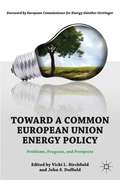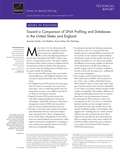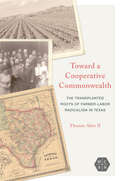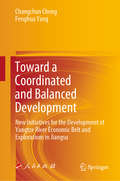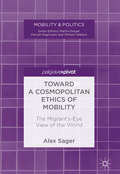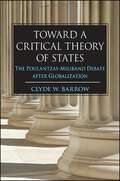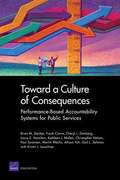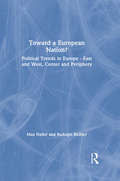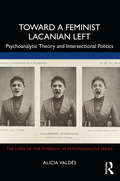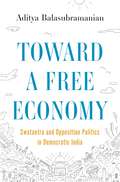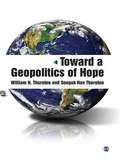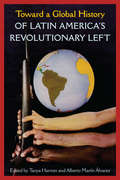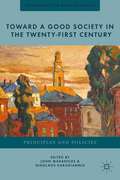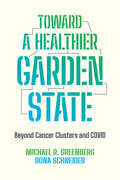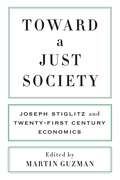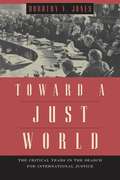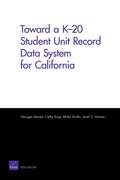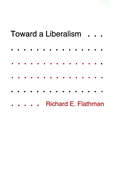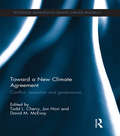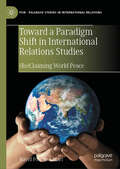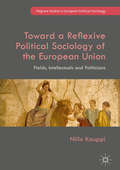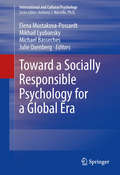- Table View
- List View
Toward a Common European Union Energy Policy: Problems, Progress, And Prospects
by Vicki L. BirchfieldSince the mid-2000s, the European Union has made unprecedented strides toward the creation of a common energy policy. This book takes stock of these developments, evaluating how much progress has actually been made and what remains to be done, what factors explain these recent advances and their limitations.
Toward a Comparison of DNA Profiling and Databases in the United States and England
by Carl Matthies Paul Steinberg Emma Disley Jeremiah GoulkaRAND researchers explored the U.S. and English forensic DNA analysis systems to find out whether England has capitalized more fully on their crime-fighting potential than the U.S. system, processing samples more quickly and providing more database hits for law enforcement.
Toward a Cooperative Commonwealth: The Transplanted Roots of Farmer-Labor Radicalism in Texas (Working Class in American History)
by Thomas AlterAgrarian radicalism's challenge to capitalism played a central role in working-class ideology while making third parties and protest movements a potent force in politics. Thomas Alter II follows three generations of German immigrants in Texas to examine the evolution of agrarian radicalism and the American and transnational ideas that influenced it. Otto Meitzen left Prussia for Texas in the wake of the failed 1848 Revolution. His son and grandson took part in decades-long activism with organizations from the Greenback Labor Party and the Grange to the Populist movement and Texas Socialist Party. As Alter tells their stories, he analyzes the southern wing of the era's farmer-labor bloc and the parallel history of African American political struggle in Texas. Alliances with Mexican revolutionaries, Irish militants, and others shaped an international legacy of working-class radicalism that moved U.S. politics to the left. That legacy, in turn, pushed forward economic reform during the Progressive and New Deal eras. A rare look at the German roots of radicalism in Texas, Toward a Cooperative Commonwealth illuminates the labor movements and populist ideas that changed the nation’s course at a pivotal time in its history.
Toward a Coordinated and Balanced Development: New Initiatives for the Development of Yangtze River Economic Belt and Explorations in Jiangsu
by Changchun Cheng Fenghua YangThe book is a comprehensive study of the strategic position of Yangtze River Economic Belt in the political and economic development of China. It is a holistic and precise qualitative and quantitative delineation of Jiangsu’s position in this belt and its development strategy, and the strategic position of Yangtze River Economic Belt in national development. It also illustrates the great significance of the initiation of Yangtze River Economic Belt for the economy, politics, environment, and integration of natural resources. There is a research of the position of Jiangsu in the construction of the nation, and the difficulties it has encountered. Coordinated and balanced development of Yangtze River Economic Belt will effectively facilitate reasonable allocation and exploitation of various resources, the implementation of other national strategies, and communication and cooperation between China and Western countries, enhancing their mutual understanding. Therefore, common readers can get some general information from different perspectives, and professionals can have a detailed understanding of different arrangements and guiding principles. It is thus suitable for different readers.Yangtze River Economic Belt runs through the three regions of China, making a vital latitudinal axis, whose coordinated and balanced development is of great strategic importance for promoting coordinated and shared development of the three regions and for the spatial balance of population, economy and the environment. The current imbalance between them, the absolute disparity in regional development, the obstruction in the flow of resource factors, the inequality in development opportunities, the incoordination between regional economic growth and the bearing capacity of resources and environment, the fragmentation of regional economic policies, all contribute to the insufficient utilization of the Golden Waterway, problems numerous. How coordinated and balanced development can be realized within this economic belt is a prominent and pressing, even a severe problem.
Toward a Cosmopolitan Ethics of Mobility: The Migrant's-Eye View of the World (Mobility & Politics)
by Alex SagerThis book proposes a cosmopolitan ethics that calls for analyzing how economic and political structures limit opportunities for different groups, distinguished by gender, race, and class. The author explores the implications of criticisms from the social sciences of Eurocentrism and of methodological nationalism for normative theories of mobility. These criticisms lend support to a cosmopolitan social science that rejects a principled distinction between international mobility and mobility within states and cities. This work has interdisciplinary appeal, integrating the social sciences, political philosophy, and political theory.
Toward a Critical Theory of States: The Poulantzas-Miliband Debate after Globalization (SUNY series in New Political Science)
by Clyde W. BarrowWe have recently lived through the turmoil of a global financial crisis that originated in the United States and, despite the platitudes of neo-liberal ideology, nation-states were deeply involved in managing this crisis. If "the state" is again a preeminent actor in the global economy, then state theory and the problem of the state should also return to the forefront of political theory. Toward a Critical Theory of States is an intensive analysis of the 1970s debate between state theorists Ralph Miliband and Nicos Poulantzas, including its wider impact on Marxist theories of the state in subsequent decades. Clyde W. Barrow makes unique arguments and contributions to this continuing discussion in state theory and lays the foundation for more theoretically informed empirical and historical research on the state in the age of globalization. He argues that by merely moving past the Poulantzas-Miliband debate, as some have recommended, scholars have abandoned much that is valuable in understanding the state, particularly the need to comprehend the contemporary transformation of the state form and the state apparatuses as part of the new conditions of globalization and transnational capital accumulation. Building upon themes of state restructuring found in Poulantzas and Miliband, Barrow establishes the outlines of an approach that integrates the thought of both to propose a synthetic understanding of the new imperialism.
Toward a Cultural Politics of Climate Change: Devices, Desires and Dissent
by Johannes Stripple Harriet Bulkeley Matthew PatersonTowards a Cultural Politics of Climate Change provides a new perspective on how climate change matters in policy-making, business and everyday life. It argues that the work of low carbon transitions takes place through the creation of devices, the mobilisation of desires, and the articulation of dissent. Using case studies from the US, Australia, and Europe, the book examines the creation and contestation of new forms of cultural politics - of how a climate-changed society is articulated, realized and contested. Through this approach it opens up questions about how, where and by whom climate politics is conducted and the ways in which we might respond differently to this societal challenge. This book provides a key reference point for the emerging academic community working on the cultural politics of climate change, and a means through which to engage this new area of research with the broader social sciences. Develops a new framework for analyzing the cultural politics of climate change, providing readers with a new perspective that bridges accounts of cultural responses to climate change and those which focus on its politics. Includes a range of international case studies which demonstrate the ways in which responses to climate change are being realized in everyday life, giving readers concrete examples from familiar areas of social and political life through which to interpret the new perspective. Provides a new approach to thinking about how climate change comes to matter in everyday life, for those seeking to look beyond 'individualist' approaches to understanding how society is responding to climate change.
Toward a Culture of Consequences
by Brian M. Stecher Frank Camm Cheryl L. Damberg Laura S. Hamilton Kathleen J. MullenPerformance-based accountability systems (PBASs) link incentives to measured performance to improve services to the public. Research suggests that PBASs influence provider behaviors, but little is known about PBAS effectiveness at achieving performance goals. This study examines nine PBASs that are drawn from five sectors: child care, education, health care, public health emergency preparedness, and transportation.
Toward a European Nation?: Political Trends in Europe - East and West, Center and Periphery
by Max HallerThis text presents the work of scholars from all over Europe who examine processes of integration and disintegration at the level of nation states, federations, regions and Europe overall.
Toward a Feminist Ethics of Nonviolence
by Judith Butler Bonnie Honig Adriana CavareroToward a Feminist Ethics of Nonviolence brings together major feminist thinkers to debate Cavarero’s call for a postural ethics of nonviolence and a sociality rooted in bodily interdependence.Toward a Feminist Ethics of Nonviolence brings together three major feminist thinkers—Adriana Cavarero, Judith Butler, and Bonnie Honig—to debate Cavarero’s call for a postural ethics of nonviolence. The book consists of three longer essays by Cavarero, Butler, and Honig, followed by shorter responses by a range of scholars that widen the dialogue, drawing on post-Marxism, Italian feminism, queer theory, and lesbian and gay politics. Together, the authors contest the boundaries of their common project for a pluralistic, heterogeneous, but urgent feminist ethics of nonviolence.
Toward a Feminist Lacanian Left: Psychoanalytic Theory and Intersectional Politics
by Alicia ValdésWhile traditional feminist readings on antagonism have pivoted around the sole axis of sex and/or gender, a broader and intersectional approach to antagonism is much needed; this book offers an innovative, feminist, and discursive reading on the Lacanian concept of sexual position as a way to problematize the concepts of political antagonism and political subjects. Can Lacanian psychoanalysis offer new grounds for feminist politics? This discursive mediation of Lacan's work presents a new theoretical framework upon which to articulate proposals for intersectional political theory. The first part of this book develops the theoretical framework, and the second part applies it to the construction of woman’s identity in European politics and economy. It concludes with notes for a feminist political and economic praxis through community currencies and municipalism. The interdisciplinary approach of this book will appeal to scholars interested in the fields of psychoanalysis, feminisms, and political philosophy as well as multidisciplinary scholars interested in discourse theory, sexuality and gender studies, cultural studies, queer theory, and continental philosophy. Students at master's and PhD level will also find this a useful feminist introduction to Lacanian psychoanalysis, discourse, and gender.
Toward a Free Economy: Swatantra and Opposition Politics in Democratic India (Histories of Economic Life #44)
by Aditya BalasubramanianThe unknown history of economic conservatism in India after independenceNeoliberalism is routinely characterized as an antidemocratic, expert-driven project aimed at insulating markets from politics, devised in the North Atlantic and projected on the rest of the world. Revising this understanding, Toward a Free Economy shows how economic conservatism emerged and was disseminated in a postcolonial society consistent with the logic of democracy.Twelve years after the British left India, a Swatantra (“Freedom”) Party came to life. It encouraged Indians to break with the Indian National Congress Party, which spearheaded the anticolonial nationalist movement and now dominated Indian democracy. Rejecting Congress’s heavy-industrial developmental state and the accompanying rhetoric of socialism, Swatantra promised “free economy” through its project of opposition politics.As it circulated across various genres, “free economy” took on meanings that varied by region and language, caste and class, and won diverse advocates. These articulations, informed by but distinct from neoliberalism, came chiefly from communities in southern and western India as they embraced new forms of entrepreneurial activity. At their core, they connoted anticommunism, unfettered private economic activity, decentralized development, and the defense of private property.Opposition politics encompassed ideas and practice. Swatantra’s leaders imagined a conservative alternative to a progressive dominant party in a two-party system. They communicated ideas and mobilized people around such issues as inflation, taxation, and property. And they made creative use of India’s institutions to bring checks and balances to the political system.Democracy’s persistence in India is uncommon among postcolonial societies. By excavating a perspective of how Indians made and understood their own democracy and economy, Aditya Balasubramanian broadens our picture of neoliberalism, democracy, and the postcolonial world.
Toward a Geopolitics of Hope
by Songok Han Thornton William H ThorntonToward a Geopolitics of Hope posits a world order marked less by univocal "globalization" than by a grating geopolitics of rival capitalisms. Now that China, Russia, and much of the undemocratic developing world have embraced capitalism, this new Second World can no longer be regarded as a fleeting phenomenon. Globalization turns out to be anything but the steadfast ally of democratization it purports to be. Indeed, the Western democratic experiment of the last two centuries is starting to look very tentative and parochial. For this the West has nothing to blame but itself. In many respects the new Second World was spawned by First World neoliberal engagement. The Washington Consensus has not only brought the world to the brink of an intractable economic depression, but has played midwife to a chronic geopolitical crisis. Hope, however, is anything but defeatist in the face of this globalist impasse. It draws upon a host of non-Western reformisms--with special attention to those of India, Burma, and the Arab Spring--to forge a Global Third Way. Likewise its moral realism bridges the classic imperatives of Third World social justice and First World security. Its paramount goal is not just a new "soft power" politics, but a post-globalist geopolitics of hope.
Toward a Global History of Latin America’s Revolutionary Left
by Tanya Harmer and Alberto Martín ÁlvarezThis volume showcases new research on the global reach of Latin American revolutionary movements during the height of the Cold War, mapping out the region’s little-known connections with Africa, Asia, and Europe. Toward a Global History of Latin America’s Revolutionary Left offers insights into the effect of international collaboration on the identities, ideologies, strategies, and survival of organizers and groups.Featuring contributions from historians working in six different countries, this collection includes chapters on Cuba’s hosting of the 1966 Tricontinental Conference that brought revolutionary movements together; Czechoslovakian intelligence’s logistical support for revolutionaries; the Brazilian Left’s search for recognition in Cuba and China; the central role played by European publishing houses in disseminating news from Latin America; Italian support for Brazilian guerrilla insurgents; Spanish ties with Nicaragua’s revolution; and the solidarity of European networks with Guatemala’s Guerrilla Army of the Poor.Through its expansive geographical perspectives, this volume positions Latin America as a significant force on the international stage of the 1960s and 1970s. It sets a new research agenda that will guide future study on leftist movements, transnational networks, and Cold War history in the region. Contributor:s José Manuel Ágreda Portero | Van Gosse | James G. Hershberg | Gerardo Leibner | Blanca Mar León | Eduardo Rey Tristán | Arturo Taracena Arriola | Michal Zourek
Toward a Good Society in the Twenty-First Century
by John Marangos Nikolaos KaragiannisHaving previously defined a good society as a sustainable society with a high level of development, significant provision of meaningful jobs, and low levels of inequality and social ills, Toward a Good Society in the Twenty-first Century provides a wide range of principles and policies that would be necessary if we are to achieve a good society. Marangos and Karagiannis have put together a comprehensive volume that explores the principles and policies needed to bring about the good society, and focuses on four broad themes which are deemed important towards achieving a good or better society: quality education and fair distribution; environmentally sustainable prosperity; inclusive economic development and significant job creation; and beneficial civic institutions, and deepening of freedom and time use. All these topics can be highly controversial and call for alternative perspectives on theoretical (philosophical) and policy grounds.
Toward a Healthier Garden State: Beyond Cancer Clusters and COVID
by Michael R. Greenberg Dona SchneiderWhile New Jersey now frequently appears near the top in listings of America’s healthiest states, this has not always been the case. The fluctuations in the state’s overall levels of health have less to do with the lifestyle choices of individual residents and more to do with broader structural issues, ranging from pollution to urban design to the consolidation of the health care industry. This book uses the past fifty years of New Jersey history as a case study to illustrate just how much public policy decisions and other upstream factors can affect the health of a state’s citizens. It reveals how economic and racial disparities in health care were exacerbated by bad policies regarding everything from zoning to education to environmental regulation. The study further chronicles how New Jersey struggled to deal with public health crises like the AIDS epidemic and the crack epidemic. Yet it also explores how the state has developed some of the nation’s most innovative responses to public health challenges, and then provides policy suggestions for how we might build an even healthier New Jersey.
Toward a Just Society: Joseph Stiglitz and Twenty-First Century Economics
by Martin GuzmanJoseph Stiglitz is one of the world’s greatest economists. He has made fundamental contributions to economic theory in areas such as inequality, the implications of imperfect and asymmetric information, and competition, and he has been a major figure in policy making, a leading public intellectual, and a remarkably influential teacher and mentor. This collection of essays influenced by Stiglitz’s work celebrates his career as a scholar and teacher and his aspiration to put economic knowledge in the service of creating a fairer world.Toward a Just Society brings together a range of essays whose breadth reflects how Stiglitz has shaped modern economics. The contributions to this volume, all penned by high-profile authors who have been guided by or collaborated with Stiglitz over the last five decades, span microeconomics, macroeconomics, inequality, development, law and economics, and public policy. Touching on many of the central debates and discoveries of the field and providing insights on the directions that academic economics could take in the future, Toward a Just Society is an extraordinary celebration of the many paths Stiglitz has opened for economics, politics, and public life.
Toward a Just World: The Critical Years in the Search for International Justice
by Dorothy V. Jones"Toward a Just World is an insightful and thoughtful history. The first half of the twentieth century and the heroic efforts of those who sought international justice during that time will be much better understood and appreciated thanks to this fascinating book. "—Robert F. Drinan, Georgetown University A century ago, there was no such thing as international justice, and until recently, the idea of permanent international courts and formal war crimes tribunals would have been almost unthinkable. Yet now we depend on institutions such as these to air and punish crimes against humanity, as we have seen in the International Criminal Tribunal for Rwanda and the appearance of Serbian leader Slobodan Milosevic before the Tribunal for the Former Yugoslavia. Toward a Just World tells the remarkable story of the long struggle to craft the concept of international justice that we have today. Dorothy V. Jones focuses on the first half of the twentieth century, the pivotal years in which justice took on expanded meaning in conjunction with ideas like world peace, human rights, and international law. Fashioning both political and legal history into a compelling narrative, Jones recovers little-known events from undeserved obscurity and helps us see with new eyes the pivotal ones that we think we know. Jones also covers many of the milestones in the history of diplomacy, from the Treaty of Versailles and the creation of the League of Nations to the Nuremberg war crimes tribunal and the making of the United Nations. As newspapers continue to fill their front pages with stories about how to administer justice to al Qaeda and Saddam Hussein, Toward a Just World will serve as a timely reminder of how the twentieth century achieved one of its most enduring triumphs: giving justice an international meaning.
Toward a K-20 Student Unit Record Data System for California
by Georges Vernez Janet S. Hansen Mirka Vuollo Cathy KropTo improve the progression of students through the educational system and to improve education quality, California needs a robust data system that can track an individual student's progress from kindergarten to college and beyond. The authors review California's multiple existing student data systems and identify steps that could be taken toward building and maintaining an integrated student data system for the state.
Toward a Liberalism
by Richard FlathmanIn Toward a Liberalism, Richard Flathman shows why and how political theory can contribute to the quality of moral and political practice without violating, as empiricist- and idealist-based theories tend to do, liberal commitments to individuality and plurality. Exploring the tense but inevitable relationship between liberalism and authority, he advances a theory of democratic citizenship tempered by appreciation of the ways in which citizenship is implicated with and augments authority. Flathman examines the relationship of individual rights to freedom on one hand and to authority and power on the other, rejecting the quest for a single homogenous and authoritative liberal theory.
Toward a New Climate Agreement: Conflict, Resolution and Governance (Routledge Advances in Climate Change Research)
by Jon Hovi David M. McEvoy Todd L. CherryClimate change is one of the most pressing problems facing the global community. Although most states agree that climate change is occurring and is at least partly the result of humans’ reliance on fossil fuels, managing a changing global climate is a formidable challenge. Underlying this challenge is the fact that states are sovereign, governed by their own laws and regulations. Sovereignty requires that states address global problems such as climate change on a voluntary basis, by negotiating international agreements. Despite a consensus on the need for global action, many questions remain concerning how a meaningful international climate agreement can be realized. This book brings together leading experts to speak to such questions and to offer promising ideas for the path toward a new climate agreement. Organized in three main parts, it examines the potential for meaningful climate cooperation. Part 1 explores sources of conflict that lead to barriers to an effective climate agreement. Part 2 investigates how different processes influence states’ prospects of resolving their differences and of reaching a climate agreement that is more effective than the current Kyoto Protocol. Finally, part 3 focuses on governance issues, including lessons learned from existing institutional structures. The book is unique in that it brings together the voices of experts from many disciplines, such as economics, political science, international law, and natural science. The authors are academics, practitioners, consultants and advisors. Contributions draw on a variety of methods, and include both theoretical and empirical studies. The book should be of interest to scholars and graduate students in the fields of economics, political science, environmental law, natural resources, earth sciences, sustainability, and many others. It is directly relevant for policy makers, stakeholders and climate change negotiators, offering insights into the role of uncertainty, fairness, policy linkage, burden sharing and alternative institutional designs.
Toward a Paradigm Shift in International Relations Studies: (Re)Claiming World Peace (Palgrave Studies in International Relations)
by Navid PourmokhtariThis book asks why the current IR paradigm has outlasted its utility and argues that despite changes to world politics, the paradigm of IR remains far more preoccupied with the dynamics of war and almost silent, when it comes to commenting on the conditions of lasting, global peace. Cognizant of the dominant paradigm’s supposed preoccupation with seeking peace, the author shows how IR’s mainstream discourses work to reproduce war.
Toward a Phenomenology of Terrorism: Beyond Who is Killing Whom (Critical Criminological Perspectives)
by David PolizziThis book examines the socio-psychological dynamics and drivers of terrorism from a humanistic perspective. Most interpret terrorism as meaningless, asocial violence but this book argues that it's not just a case of seeing 'who is killing whom' but that defining and understanding terrorism is configured by historical context and immediate experience. The author argues that these acts of terrorist violence can be interpreted as the external expression of repressed feelings and impulses that have been tabooized by mainstream society. Upon release, these terrorists gain a new 'nomos' which generates a sense of meaning and significance for them. This book draws on psycho-analytical theories of repression, Heideggerian existentialism, Berger’s anthropological concept of culture as ‘nomos’, and Roger Griffin’s analysis of terrorist fanaticism, adding to the understanding terrorism and criminality from a new perspective and beyond the usual literature situated in political science, security/war and peace studies. This book seeks to provide: a definition of terrorism, an account of the psychological theory, an explanation of the nomic dimension of terroristic violence, an exploration of the relevance of the new approach to understanding: Salafi jihadism, Al-Qaeda, Islamic State, the Taliban, White Supremacism, the rise of the Radical Right, and reflections on this for combating terrorism. It appeals to those interested in terrorism, conflict, terrorist radicalization and motivation, international relations, politics and religious politics, and to counter-terrorism agencies.
Toward a Reflexive Political Sociology of the European Union
by Niilo KauppiThis book argues that contemporary European politics creates new forms of transnational power that challenge the traditional parameters of the nation-state. Kauppi identifies and critically explores the evolving dynamics between national and transnational spaces, groups and knowledge, and suggests that European public policies and transnational institutions like the European Parliament create new spaces, types of knowledge and novel political practices. Toward a Reflexive Political Sociology of the European Union is structured around three parts. The first focuses on evolving transnational fields. The second explores the changing role of academics and universities. The third section engages with the works of Pierre Bourdieu on politics and the media. The issues discussed throughout the book revolve around the challenges to the nation-state and of knowledge production that is tied to it. This book will be an invaluable resource to academics and researchers interested in European politics, European Union studies and political sociology.
Toward a Socially Responsible Psychology for a Global Era
by Elena Mustakova-Possardt Mikhail Lyubansky Michael Basseches Julie OxenbergThis book explores the concept of "socially-responsible psychology in a global age" and how it might be used to organize, integrate and bring enhanced focus a field that has the potential to contribute to solutions to the world's most pressing problems. In this volume, the editors explore the central and defining features of socially-responsible psychology, challenges that this work would face, and the mechanisms and processes by which psychological work could be synergistically integrated with the work of other disciplines. For this purpose, the volume also examines a variety of factors currently that limit psychology in carrying out this goal.
